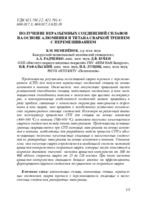| dc.contributor.author | Неменёнок, Б. М. | ru |
| dc.contributor.author | Радченко, А. А. | ru |
| dc.contributor.author | Бубен, Д. В. | ru |
| dc.contributor.author | Рафальский, И. В. | ru |
| dc.contributor.author | Лущик, П. Е. | ru |
| dc.coverage.spatial | Минск | ru |
| dc.date.accessioned | 2021-01-28T09:46:12Z | |
| dc.date.available | 2021-01-28T09:46:12Z | |
| dc.date.issued | 2020 | |
| dc.identifier.citation | Получение неразъемных соединений сплавов на основе алюминия и титана сваркой трением с перемешиванием = Friction stir welding of aluminum and titanium alloys for producing permanent joints / Б. М. Неменёнок [и др.] // Металлургия : республиканский межведомственный сборник научных трудов : в 2 ч. / редкол.: И. А. Иванов (гл. ред) [и др.]. – Минск : БНТУ, 2020. – Вып. 41, ч. 2. – С. 15-27. | ru |
| dc.identifier.uri | https://rep.bntu.by/handle/data/84788 | |
| dc.description.abstract | Представлены результаты исследований сварки трением с перемешиванием (СТП) для получения неразъемных соединений сплавов на основе алюминия и титана. Отмечается, что отсутствие правильной оценки реакционной способности сплавов, подлежащих соединению, в том числе повышенная способность титана к окислению при высоких температурах, и конструктивных особенностей соединений может приводить к ряду проблем, связанных с изменением структуры материалов и дефектами в зоне сварки, что приводит к неизбежному ухудшению механических характеристик готовых соединений. Несмотря на различный диапазон температур проведения СТП для сплавов на основе алюминия (400–500 С) и титана (700–950 С), возможно получение качественного сварного соединения между этими материалами. Представлены основные границы свариваемости при СТП листовых материалов на основе алюминия и титана, необходимые для разработки модели процесса СТП и обеспечивающие получение качественных стыковых и нахлесточных соединений из разнородных материалов на основе алюминия и титана. Установлено, что качество сварки определяется в наибольшей степени частотой вращения инструмента и скоростью сварки, которые могут изменяться в широком диапазоне значений: частота вращения инструмент от 300 до 900 об/мин; скорость сварки от 25 до 120 мм/мин. При этом частота вращения инструмента оказывает большее влияние на эффективность формирования сварного соединения по сравнению со скоростью сварки. | ru |
| dc.language.iso | ru | ru |
| dc.publisher | БНТУ | ru |
| dc.title | Получение неразъемных соединений сплавов на основе алюминия и титана сваркой трением с перемешиванием | ru |
| dc.title.alternative | Friction stir welding of aluminum and titanium alloys for producing permanent joints | ru |
| dc.type | Article | ru |
| local.description.annotation | The results of studies of friction stir welding (FSW) are presented to obtain permanent joints of aluminum and titanium alloys. It is noted that the lack of a correct assessment of the reactivity of the alloys to be joined, including the increased titanium oxidation ability at high temperatures, and the structural features of the compounds can lead to a number of problems associated with a change in the structure of materials and defects in the welding zone, decreasing the mechanical characteristics of the permanent joints. Despite the different temperature range of the FSW for aluminum (400–450 C) and titanium (700–950 C) alloys, it is possible to obtain a high-quality welded joint between these materials. The paper presents the main weldability boundaries in the case of FSW of aluminum and titanium sheet materials, which are necessary for the development of the FSW process and provide high-quality butt and lap joints of friction welding with mixing dissimilar materials based on aluminum and titanium. It has been established that the quality of welding is determined to the greatest extent by the frequency of rotation of the tool and the speed of welding, which can vary over a wide range of values: frequency of rotation of the tool from 300 to 900 rpm; welding speed from 25 to 120 mm/min. In this case, the rotational speed of the tool has a greater effect on the efficiency of the formation of the welded joint compared to the welding speed. | ru |

